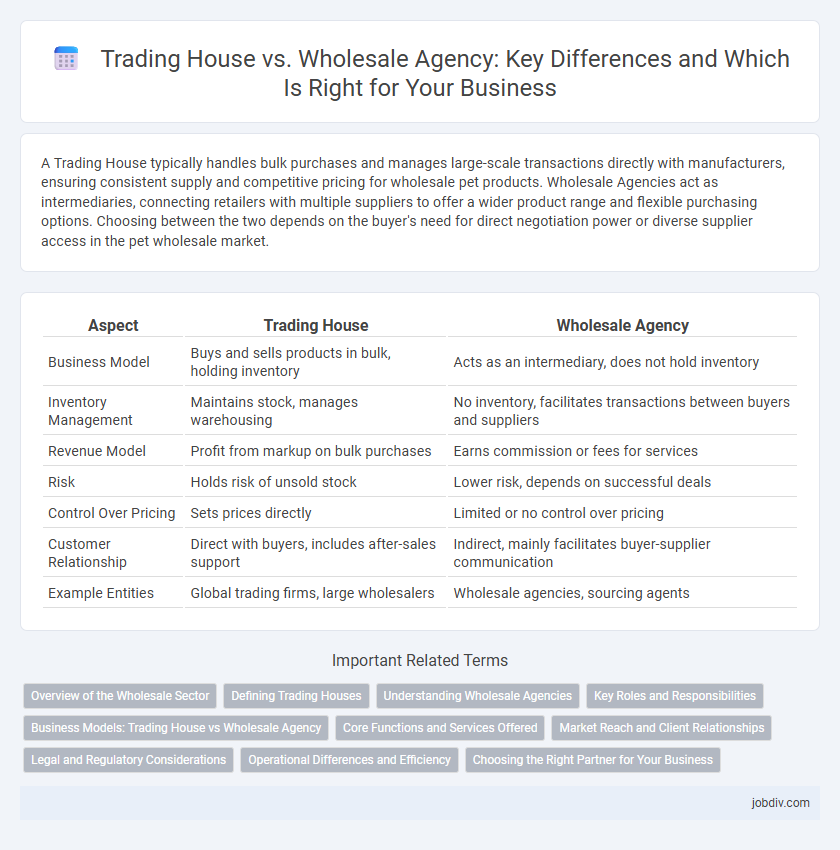A Trading House typically handles bulk purchases and manages large-scale transactions directly with manufacturers, ensuring consistent supply and competitive pricing for wholesale pet products. Wholesale Agencies act as intermediaries, connecting retailers with multiple suppliers to offer a wider product range and flexible purchasing options. Choosing between the two depends on the buyer's need for direct negotiation power or diverse supplier access in the pet wholesale market.
Table of Comparison
| Aspect | Trading House | Wholesale Agency |
|---|---|---|
| Business Model | Buys and sells products in bulk, holding inventory | Acts as an intermediary, does not hold inventory |
| Inventory Management | Maintains stock, manages warehousing | No inventory, facilitates transactions between buyers and suppliers |
| Revenue Model | Profit from markup on bulk purchases | Earns commission or fees for services |
| Risk | Holds risk of unsold stock | Lower risk, depends on successful deals |
| Control Over Pricing | Sets prices directly | Limited or no control over pricing |
| Customer Relationship | Direct with buyers, includes after-sales support | Indirect, mainly facilitates buyer-supplier communication |
| Example Entities | Global trading firms, large wholesalers | Wholesale agencies, sourcing agents |
Overview of the Wholesale Sector
The wholesale sector encompasses diverse business models, including trading houses and wholesale agencies, each playing a pivotal role in supply chain management. Trading houses typically operate as intermediaries with extensive inventory and direct purchasing power from manufacturers, enabling bulk distribution to retailers and businesses. Wholesale agencies function primarily as representatives or brokers, facilitating transactions without necessarily holding inventory, thereby connecting manufacturers with buyers through commission-based arrangements.
Defining Trading Houses
Trading Houses are large, multifaceted companies that engage in global wholesale distribution, often managing end-to-end supply chains across multiple industries. They act as intermediaries, purchasing bulk goods from manufacturers and selling them to retailers or other businesses, while providing value-added services such as logistics, financing, and market intelligence. Unlike Wholesale Agencies, which primarily facilitate transactions without taking ownership of goods, Trading Houses assume inventory risk and maintain significant control over product flow and pricing.
Understanding Wholesale Agencies
Wholesale agencies act as intermediaries connecting manufacturers with retailers without taking ownership of the products, enabling manufacturers to expand their market reach efficiently. Unlike trading houses that purchase and store inventory, wholesale agencies focus on facilitating sales and negotiations, reducing financial risk and inventory costs for all parties involved. Their expertise in market trends and retailer relationships makes them invaluable for manufacturers seeking to penetrate new markets quickly and cost-effectively.
Key Roles and Responsibilities
Trading houses manage the procurement, storage, and distribution of goods, often holding inventory and assuming financial risks to facilitate large-scale transactions between manufacturers and retailers. Wholesale agencies act as intermediaries without owning the products, focusing on connecting suppliers with buyers, negotiating deals, and ensuring smooth transactions while earning commissions. Key responsibilities of trading houses include logistics and inventory management, whereas wholesale agencies prioritize client representation and market expansion services.
Business Models: Trading House vs Wholesale Agency
Trading houses operate by purchasing large volumes of goods directly from manufacturers, maintaining inventory, and reselling to retailers or businesses, enabling better control over pricing and supply chain logistics. Wholesale agencies function as intermediaries, facilitating transactions between suppliers and buyers without holding inventory, focusing on commission-driven sales and client relationship management. This business model difference impacts capital investment, risk exposure, and operational flexibility within the wholesale industry.
Core Functions and Services Offered
Trading Houses specialize in purchasing bulk goods directly from manufacturers and managing inventory to sell in large quantities, facilitating supply chain efficiency and cost savings. Wholesale Agencies act as intermediaries connecting manufacturers and retailers without holding inventory, focusing on negotiation, order facilitation, and market expansion. Core functions of Trading Houses include procurement, warehousing, and logistics, while Wholesale Agencies primarily provide market representation, sales promotion, and contract management.
Market Reach and Client Relationships
Trading Houses typically possess extensive market reach due to their established infrastructure and direct sourcing capabilities, enabling them to serve a broad spectrum of clients globally. Wholesale Agencies often specialize in cultivating strong, personalized client relationships by acting as intermediaries between manufacturers and buyers, offering tailored services to niche markets. The choice between the two depends on whether businesses prioritize expansive distribution networks or customized client engagement strategies.
Legal and Regulatory Considerations
Trading houses operate as independent entities legally responsible for purchasing and selling goods, requiring compliance with international trade laws, customs regulations, and import-export licenses. Wholesale agencies act as intermediaries representing principals without taking ownership of goods, often governed by agency laws and contracts, which limit their liability compared to trading houses. Regulatory compliance for trading houses is typically more complex, including tax obligations and product standards, whereas wholesale agencies focus on adherence to agency agreements and local commercial regulations.
Operational Differences and Efficiency
Trading houses typically manage procurement, inventory, and logistics internally, allowing for streamlined operations and direct control over supply chains. Wholesale agencies act as intermediaries between manufacturers and retailers, often relying on third-party logistics and offering limited inventory management, which can introduce inefficiencies in order fulfillment. Operational efficiency in trading houses is enhanced by integrated processes and centralized decision-making, whereas wholesale agencies depend on external coordination, potentially leading to slower response times and higher operational costs.
Choosing the Right Partner for Your Business
Trading houses provide comprehensive services including product sourcing, quality control, and logistics management, making them ideal for businesses seeking an all-in-one solution. Wholesale agencies specialize in connecting manufacturers with retailers, offering market expertise and negotiation skills without holding inventory, which reduces overhead costs. Selecting the right partner depends on your business needs for inventory control, market reach, and service level requirements.
Trading House vs Wholesale Agency Infographic

 jobdiv.com
jobdiv.com